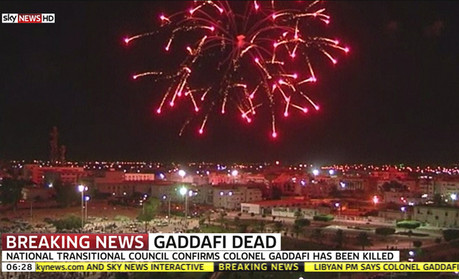
Sky News reporting the death of Libyan leader Muammar Gaddafi on 20 October 2011
Credit: Still from Sky NewsWhen Sarah Whitehead started her new role as head of international news at Sky News on 5 January 2011 little did she know that it would be such an extraordinary year for news.
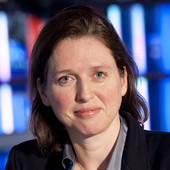 This year
has seen the deaths of Osama Bin Laden, Muammar Gaddafi and Kim
Jong-Il; the Arab Spring; floods in Australia, Brazil and Thailand;
earthquakes in New Zealand, Turkey and Japan, plus shootings in
Norway and an unravelling global financial crisis.
This year
has seen the deaths of Osama Bin Laden, Muammar Gaddafi and Kim
Jong-Il; the Arab Spring; floods in Australia, Brazil and Thailand;
earthquakes in New Zealand, Turkey and Japan, plus shootings in
Norway and an unravelling global financial crisis."It's been one of those years when you just can't believe that things keep happening," Whitehead told Journalism.co.uk. "It's given me fantastic challenges, fantastic successes, it's been brilliant for Sky and it's been an amazing challenge to deal with all the issues that go with running a foreign news department of a major multiplatform news provider."
Q. What or who are you most proud of?
A. I'm incredibly proud of our coverage in Libya and Egypt and more recently in Syria. We obviously covered Tunisia and Bahrain as well, but I think that we started with some really extraordinary coverage of Egypt. It was just one of those stories, which because it happened in a relatively short period of time and because it was intense because it all happened in one place in front of you, I was phenomenally proud of what we managed to achieve and how we did that story. We covered it live, we provided context for our audience and we really delivered on a whole range of different platforms and I think that really set us on a fantastic path this year.
Libya made me so proud. We maintained a presence pretty much throughout the whole of the Libyan revolution either in the east or in Tripoli. I'm phenomenally proud of what Alex Crawford achieved in Zawiya, when over one terrifying weekend she and her team were trapped in the town. They were there looking for demonstrators opposed to Gaddafi after Friday prayers and she ended up being there when the Gaddafi troops turned up and opened fire on the protestors and then was stuck for three days. It was terrifying, really terrifying and we didn't know how they were going to get out because the car and the driver that they had arrived with had fled.
But they did and they bore witness to really the first first-hand evidence of Gaddafi killing his own people, an extraordinary film. And then her extraordinary Sunday night at the end of August when she joined that convoy with three other members of her team and ended up driving all the way into Green Square [in Tripoli]. Talking to them earlier in the evening, nobody had any idea that that's where they would end up. We knew that there was a convoy and that it was heading into Tripoli but I just presumed it would get to the outskirts and then be driven back. So to see those pictures of them in Green Square was extraordinary.Sky is really quite a small place, it's really quite a small foreign news team and every single correspondent has had to absolutely pull their weightSarah Whitehead
We also need to look ahead and see what Stuart Ramsey has just achieved with his coverage of Syria and the extraordinary bravery from that team who went into Homs within the last few weeks and showed civilians under fire: children and women getting bread in the morning and then a sniper attack opening up. That just bears witness to what we have been unable to really show before, which is the reality of life on the ground.
Sky is really quite a small place, it's really quite a small foreign news team and every single correspondent has had to absolutely pull their weight. And that includes the people back in London, turning these pieces around, planning, working with the people out in the field and I'm just incredibly proud of everything that we've achieved.
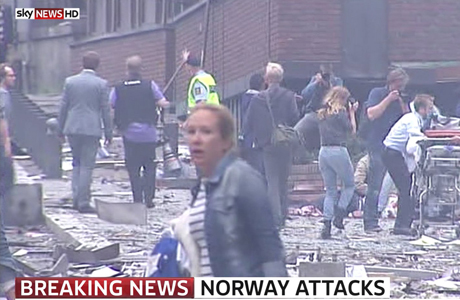
Sky News reporting the Norway attacks on 22 July 2011
Q. Have there been tough decisions to make, such as deciding not to go to Yemen?
Of course there have. One of the things that I that I think people forget is that we all have budgets and we have budgets that we have to keep to and we have budgets which mean that we have to make decisions about what we go to.
I think that with Sky we have a very clear remit: we know what we are, we know our identity, we know what we are about and I think that what I have absolutely focused on this year is a determination to send [journalists] to places and to stories where we will have an impact, where we will be there as things are unfolding, as the story is still happening. Not after an event, not an event that's over, but actually to be there as things are ongoing.
Yemen was a really difficult decision because it is a story that is still ongoing and it is one of the big stories that most of the international media haven't done to the same extent as other Arab spring stories. That's because of budgets and the danger and really what we are going to be able to achieve. But that's hard when you see week in, week out there are people being killed on the street and a huge power struggle happening. And we know that Yemen has huge significance and it is important that we report that story.
With every story that we haven't actually been to and we haven't done an ongoing deployment to, we really try to make sure that from the UK, with our specialist foreign affairs editor, Tim Marshall, and Lisa Holland, our other correspondent who concentrates on foreign news, we actually bring something to it. We also have incredibly brave and very good stringers, freelancers around the world who we talk to regularly in these places in order to bring that story alive and to have people who are there on the ground and and see what's going on. Tom Finn in Yemen has really been an extraordinary freelancer for us. Week in, week out he has spoken to us and been phenomenally brave in reporting from Yemen.
Q. How do you cope with safety concerns when sending journalists to dangerous places?
A. Everybody has to come back. Everybody has to come back well, in one piece, absolutely fine and having got a great story, that's the ambition.
The safety concerns this year have been extraordinary. I have never known a time of so much danger thrown at so many people. And that's across the whole journalistic community. Week after week, month after month, story after story, people have had things thrown at them.
Japan, without a shadow of a doubt, was the most extreme [example of a dangerous situation] because we don't deal with nuclear fallout on a day-to-day basis. So you are starting from a very low base when you are thrown not just an earthquake zone, which is dangerous enough because there are chemicals in the air, power plants that are unstable and fire, but then there are aftershocks, the need to find shelter and there are petrol problems. Then there is the [nuclear] threat and you are really not sure whether the information you are getting is right or not and there is the threat that the air that you are breathing is dangerous. That's probably the most difficult thing that I've had to deal with this year because what it does to people on the ground is to create this real, palpable fear that you don't get in war zones as such. It's because it's unknown, it's because you can't see it and it's because we just don't know enough about the dangers.The safety concerns this year have been extraordinary. I have never known a time of so much danger thrown at so many peopleSarah Whitehead
The fact that Japan happened at the same time as when Libya was witnessing really quite a ferocious level of fighting meant it was a very exhausting time.
I always work on the basis that you have to be absolutely sure, as somebody in my position, that you can deal with the level of risk that is out there. So if something happened to one team, how would that impact on what you are doing and who else is out there? I'm always very careful about the number of people that we are putting into very dangerous situations so we can actually deal with it back here.
Ultimately, you put the right teams on the ground and those right teams are the people you believe in and you trust to make the right decisions. You are not there and you can't be directing them, they have to make those decisions for themselves.
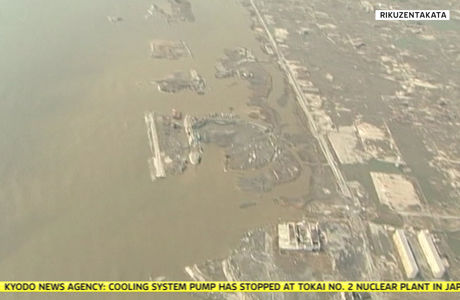
Sky News reporting on the earthquake, tsunami and nuclear crisis in Japan in March 2011
Q. To what extent has the international news budget been an area of concern and pressure?
A. It's been a huge concern, an absolutely huge concern because the stories haven't stopped and we are all aware that more and more happens and could happen. There have been some situations where we have been faced with having to decide what we might do on the basis that we've still got quite a lot of our financial year to go.
I think every single news organisation in the world has had their foreign budget stretched this year. But I also think that there's been an understanding from the top of the news organisations that these are extraordinary times and these are extraordinary stories and this is when people come to news organisations, to know what's going on.
I think every single news organisation in the world has had their foreign budget stretched this year. We have been very determined to focus on covering the stories that have an impact and where our audience, our customers, our viewers, are readers, really benefit from us being on the ground. We must ensure that the money is spent in the right places – but that has meant not going to some stories. And that's difficult and tricky for the likes of me who wants to be at those big stories, at those key moments. I have had to make quite difficult calls.
At Sky we have a fantastic network of partners and affiliations and freelancers and colleagues around the world who all help us out. We were unable to go to the Turkish earthquake. We made a decision that there were fantastic freelancers there and there were satellite trucks and and that's how we covered that story, with pieces done from here and with live commentary done from there. That's an example of a big story and an important story that we weren't able to go to.
But It's not just financial. It's also about the levels of exhaustion among the teams and about how many stories and how many times people can keep going out and making sure that teams who do go out are ready for the next story that we absolutely have to be at. It is about people as well as money.
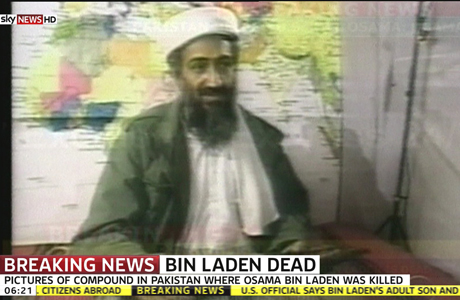
Sky News reporting the death of Osama Bin Laden on 2 May 2011
Q. What is on the international news agenda looking forward to 2012?
A. 2012 looks like it's going to be another massive year. What started this year in Tunisia and moved on to Egypt and Libya and Bahrain and Syria is not going away. I think everybody knows that they are going to have to keep a very, very close eye on what's happening in Libya and Egypt and Tunisia and very firmly on Syria.
The crisis in the Euro zone is going to be a huge focus. It's a big British political story, but its also a big focus that will be across Europe and the elections in France. And of course there are American elections.
Interestingly, Sky News is not a big anniversary place, we don't necessarily go and revisit, but I think Japan is one of those extraordinary stories that we will definitely explore.
Free daily newsletter
If you like our news and feature articles, you can sign up to receive our free daily (Mon-Fri) email newsletter (mobile friendly).
Related articles
- New global network investigates obstacles to climate action
- 'Don't force the readers to make assumptions'
- Three quarters of women journalists experience threat to their safety
- Sky News and Tortoise create data project mapping the money in British politics
- Five questions for every newsroom to ask themselves on World Press Freedom Day









